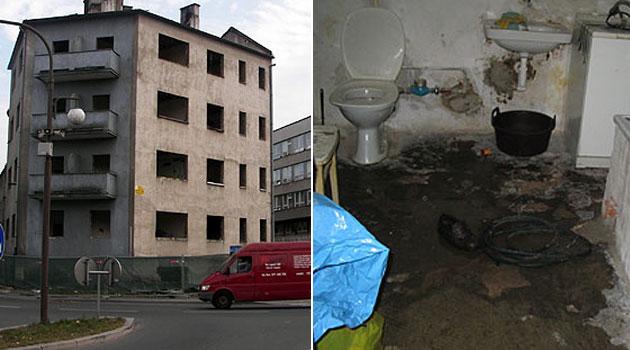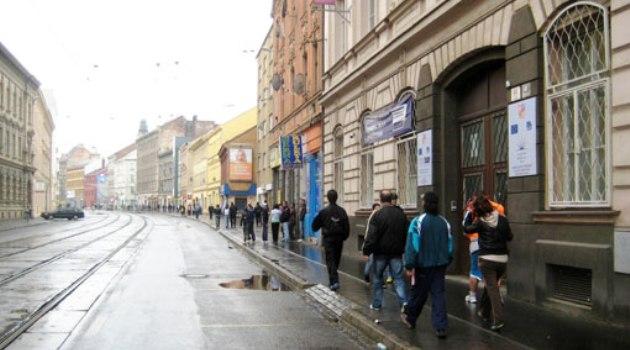Czech Constitutional Court rejects complaint from municipality defending its 2006 eviction of Romani residents

The Czech Constitutional Court Ústavní soud (ÚS) has rejected a complaint filed by the town of Vsetín about its protracted dispute with the Romani people whom it “deported” and forced to take up residence in municipalities outside of the Zlín Region altogether. The Czech News Agency reported the news on 1 June after discovering it in the judiciary’s database.
The Romani evictees are seeking compensation from the town. No verdict has yet taken effect in relation to the scandalous case.
The town did not like the approach taken by the High Court in Olomouc, which has repeatedly overturned a decision by the Regional Court in Ostrava and most recently also instructed that the judge ruling on the case be replaced. For that reason, the town appealed to the Constitutional Court before the final verdict is handed down.
Vlastimil Göttinger, the head of public relations at the Constitutional Court, told the Czech News Agency the complaint was refused because one part of it was inadmissible and the rest was obviously unfounded. According to previous statements made by the now former Mayor of Vsetín, Jiří Čunek (Christian Democrats – KDU-ČSL), the town believes that any conviction requiring them to pay compensation to the Romani plaintiffs would be “an unprecedented injustice to the citizens of Vsetín, a denial of common sense, and confirmation of the opinion that showing mercy to socially excluded Romani people does not pay.”
The Romani plaintiffs are of the opinion that the town violated their fundamental human rights. Their lawsuit to that effect has been repeatedly rejected by the Regional Court.
According to the High Court, however, the actual aim of the eviction of the Romani families was never to arrange for substitute accommodation for them, but to get rid of the problem altogether by putting it on the plates of other local governments. The High Court has also insisted on seeing more thorough evidence of the gravity of the damages caused to the plaintiffs.
Čunek’s “deportation” of Romani residents from Vsetín
The town of Vsetín, in its capacity as landlord, evicted Romani tenants from a centrally-located, dilapidated galleried apartment building in 2006. The town hall bought old houses in the Jesenice area through a real estate office, forced the evicted Romani tenants to move into those properties sight unseen using various threats, and forced them to assume loans from the town to buy the properties that they would pay back over the course of 20 years.
Approximately 40 Romani families were forcibly evicted by the town from the center to the periphery, where they were housed in apartment units made out of shipping containers. The rest were forcibly relocated into villages in the Jesenice and Prostějov areas, where they were expected to live in houses that were uninhabitable and to assume loans for their purchase.
Three Romani families who owed back rent were also forcibly relocated into old homes in the villages of Stará Červená Voda, Vidnava and Vlčice. Those Romani tenants are paying off the interest-free loan given to them by the town to buy the properties.
Later Čunek forcibly relocated more Romani residents away from Vsetín, specifically to the villages of Čechy pod Kosířem and Dřevnovice in the Prostějov district. In that case there were two families involved with a total of 26 members.
The evictions 10 years ago were investiated by the police, the state prosecutor, and the then-Czech Public Defender of Rights, Otakar Motejl. While according to police the former mayor did not break the law by orchestrating the evictions, Motejl said he believed the town hall had committed wrongdoing and violated the Romani families’ right to respect for their family life and privacy.
Senators from the Human Rights Committee of the upper house then supported Motejl’s statement on the issue. The Romani residents allege that they were “deported” from Vsetína through the use of force.
“They intimidated us, they said we would end up on the street and our kids would be sent to a [state] home,” Romani evictee Jolana Tulejová described the pressure put on the community to news server iDNES.cz in 2006. The Romani evictees also criticized the fact that employees of the local authority forced them to sign papers that they could not even read in connection with the purchases of the single-family homes.
The Romani evictees were not afforded the opportunity to freely chose the places to which they and their families would move. The state of the single-family homes they were relocated to was very poor, which was confirmed at the time by the seller of one of the properties, who also criticized the fact that the town had hired brokers to facilitate the sales.
“If I had known it would just be resold I would never have signed the contract. It’s an old, small building that needs repairs. Eleven people wouldn’t even fit inside it,” Olga Juklová, one of the original owners of the properties the Romani families were forced to buy, told the Czech daily Mf DNES at the time.
Juklová sold a single-family home through the Real Spectrum agency in Prostějov for CZK 320 000 [EUR 12 000], but the Tulej family, who were forced to assume a loan to buy it, were charged CZK 460 000 [EUR 17 500]. The Romani plaintiffs are seeking compensation of CZK 5.2 million [EUR 200 000] from the town.
